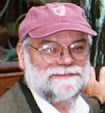Four hundred years ago, William Shakespeare wrote a poem that Eliot Spitzer needs to read. Here it is:
When, in disgrace with fortune and men's eyes,
I all alone beweep my outcast state,
And trouble deaf heaven with my bootless cries,
And look upon myself, and curse my fate,
Wishing me like to one more rich in hope,
Featured like him, like him with friends possessed,
Desiring this man's art and that man's scope,
With what I most enjoy contented least;
Yet in these thoughts myself almost despising,
Haply I think on thee—and then my state,
Like to the lark at break of day arising
From sullen earth, sings hymns at heaven's gate;
For thy sweet love rememb'red such wealth brings
That then I scorn to change my state with kings.
William Shakespeare (Sonnet 29)
I don't know if there is anyone left to whom Eliot Spitzer can say, "Haply I think on thee . . ." Maybe his wife, maybe his children, maybe the Good Lord. There can be redemption after disgrace--but it doesn't come cheaply! I remember a scene from the movie Gandhi, which appeared in the 1980's. A man who had murdered many people in the ethnic and religious strife of India confesses to Gandhi and says he is in hell. Gandhi says back to him," I know a way out of hell . . . ." and the way involved service to those who had been so gravely offended.
There is a way out of hell, Eliot Spitzer, and there is redemption. but the way is very difficult!
Thursday, March 13, 2008
A Poem for Eliot Sptizer; A Way Out of Hell
Labels:
Eliot Spitzer,
Gandhi,
redemption,
William Shakespeare
Subscribe to:
Post Comments (Atom)


No comments:
Post a Comment